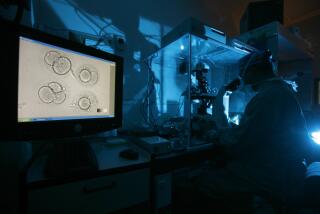Producer of L-Tryptophan Named in $30-Million Suit
- Share via
A Burbank couple filed a $30-million lawsuit Monday against a manufacturer of the dietary supplement L-tryptophan, alleging that impurities in the product severely disabled the woman.
Mike and Cecile Gracy filed the suit in Burbank Superior Court, claiming that Showa Denko of Tokyo produced impure batches of tryptophan in late 1988 and early 1989 that caused Cecile Gracy to develop eosinophilia-myalgia syndrome, a potentially fatal muscle and blood ailment.
The 30-year-old woman was hospitalized last October for back pain, muscle atrophy, partial paralysis and skin thickening, among other problems, after taking the supplement for about six months, Mike Gracy said. She has since been released but has not recovered, he said.
“I have not noticed anything else in her medical records that would seem to indicate that this was caused by anything other than L-tryptophan,” said Robert R. Star, an Encino attorney representing the Gracys. “We’re dealing strictly with a product created and distributed in a negligent manner.”
Bob Schwadron, a spokesman for Showa Denko in New York, declined to comment on the lawsuit. He acknowledged that other lawsuits had been filed against the company, the largest of six tryptophan suppliers.
The U.S. Food and Drug Administration last November ordered a total recall of L-tryptophan, after federal and state health officials concluded there was a link between a U.S. epidemic of eosinophilia-myalgia syndrome and the supplement.
As of last Friday, 1,531 cases, including 27 deaths, had been reported to the Centers for Disease Control in Atlanta. Of those, 275 were reported from California.
Last month, researchers presented the strongest evidence to date linking the epidemic to batches of the supplement manufactured in late 1988 and early 1989 by Showa Denko.
Health officials from Minnesota, Oregon, New Mexico and New York presented data at a medical meeting in New Mexico showing that about 95% of the cases they had studied extensively could be traced to Showa Denko. Minnesota researchers said they had identified specific changes in Showa Denko’s manufacturing techniques that seemed to be related to increased amounts of an impurity in the company’s tryptophan.
The meeting was organized by Dr. Phillip Hertzman, a Los Alamos, N.M., family practitioner who helped discover the syndrome last October.
More to Read
Inside the business of entertainment
The Wide Shot brings you news, analysis and insights on everything from streaming wars to production — and what it all means for the future.
You may occasionally receive promotional content from the Los Angeles Times.









